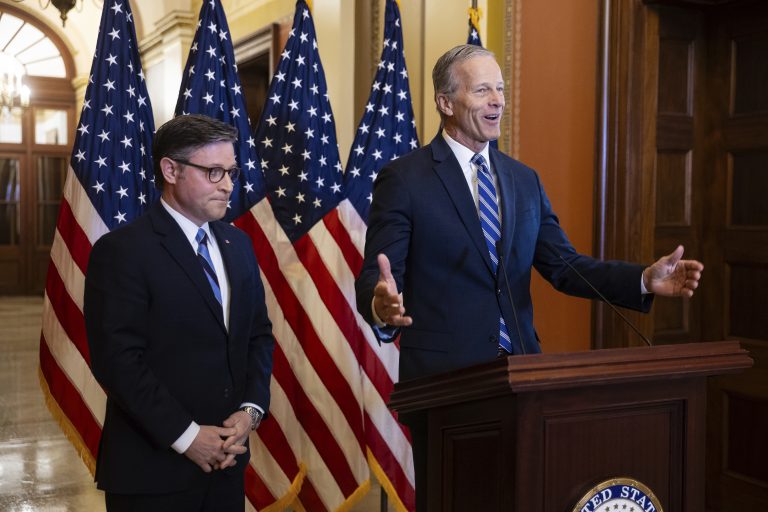Republicans’ ambitious July 4 target for their sweeping domestic policy legislation is facing new doubts this week as GOP leaders in the House and Senate push and pull over changes to the complex megabill.
Speaker Mike Johnson said in an interview Wednesday that while he believed Republicans were “on track” for final passage by the self-imposed deadline, that depended on the Senate approving a bill that hews close to the version that passed the House last month.
“We’ll see what they produce,” Johnson said, adding: “I just need them to come to their final decisions on everything. So we’ll see how it shapes up.”
Privately, top leadership aides believe that while the Senate could still finish its work by July 4, the process might take several more weeks — or months — if the Senate departs dramatically from the House product.
Among the open questions leaders are working through is the endgame for final passage of the bill. Top officials in the House, Senate and White House all want to avoid another big fight over the bill in the House and another round of “pingpong” where the bill goes back and forth between the two chambers.
The hope is to incorporate any final negotiations into the Senate version so the House can take a vote on final approval only without making any changes. But to do that, the two chambers would have to resolve key fights — including over the level of spending cuts, business tax cut extensions and the cap on the state and local tax deduction — in advance.
In an ideal scenario, Senate Republicans would offer a “wraparound” amendment reflecting a bicameral agreement at the end of the long series of amendment votes known as vote-a-rama — allowing for a relatively fast up-or-down vote in the House.
The alternative would be entering into a much lengthier conference between the two chambers after Senate passage — negotiations that leaders fear could add weeks, if not months, to the process. While several GOP senators have floated a conference, leaders have repeatedly tamped down the idea.
Johnson declined to weigh in on the procedural questions Wednesday: “I’m in constant communication with [Senate GOP leaders], but there’s still a lot of question marks over it.”
Senate Majority Leader John Thune said in an interview that his team, as well as key Senate committee chairs, are working with Johnson to avoid a scenario where the House makes changes to the bill that passes the Senate. That includes weekly meetings, and more frequent phone calls, with the speaker and his team.
“There’s just a lot of coordination to hopefully avoid some of the potential snafus that could happen with something that’s this complicated,” Thune said.
For example, Rep. Nick LaLota (R-N.Y.) is meeting with Senate GOP leadership staff Wednesday to discuss the House’s proposed increase to the SALT cap ahead of the Senate vote. Meanwhile, House GOP rebels Chip Roy (R-Texas) and Scott Perry (R-Pa.) met with Senate GOP fiscal hawks Mike Lee (R-Utah), Ron Johnson (R-Wis.) and Rick Scott (R-Fla.) on Tuesday night as they push the Senate to carve out deeper spending cuts and maintain the House’s rollback of clean energy tax credits.
The White House is keeping pressure on, as well. Trump border czar Tom Homan attended a Senate GOP lunch Wednesday, underscoring the need for the additional immigration enforcement funding in the bill.
Senate committees chairs continue to roll out pieces of the bill this week, with all eyes on Finance Chair Mike Crapo (R-Idaho), whose panel is handling the thorniest parts of the legislation and might not release text until next week. Thune and other GOP leaders are already planning to use next week to negotiate additional changes to the bill in the lead-up to floor action the following week.
Both Johnson and Thune met separately with President Donald Trump on Monday. Afterward, even the president acknowledged during a White House event that the July 4 timeline could slip.
“If it takes a little longer, that’s OK,” Trump said.

